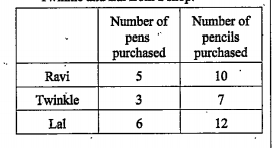Two events A and B wll be independent,if
a)A and B are mutually exclusive
b) P(A'B')=[1-P(A)] [1-P(B)]
c)P(A)= P(B)
d)P(A)+P(B)=1Solution in Malayalam
A and B are mutually exclusive
P(A'B')=[1-P(A)] [1-P(B)]
P(A)= P(B)
P(A)+P(B)=1
The correct Answer is:B
Step by step video, text & image solution for Two events A and B wll be independent,if a)A and B are mutually exclusive b) P(A'B')=[1-P(A)] [1-P(B)] c)P(A)= P(B) d)P(A)+P(B)=1 by Maths experts to help you in doubts & scoring excellent marks in Class 12 exams.
Updated on:21/07/2023Topper's Solved these Questions
Similar Questions
Consider the following information regarding the purchase of pens and penciles by the three students Ravi, Twinkle and Lal from a shop.
 Represent the above data in the form of a 3×2 matrix. What does the entry in the 2nd row and in the first column represent?
Represent the above data in the form of a 3×2 matrix. What does the entry in the 2nd row and in the first column represent?
View SolutionLet A be the set of all 50 students of class X in a school. Let f:A→N
be function defined by f(x) = roll numbers of the student x. Show that
f is one-one but not onto
View SolutionTwo events A and B will be independent, if(A) A and B are mutually exclusive(B) P(A'B')=[1−P(A)][1−P(B)](C) P(A)=P(B) (D) P(A)+P(B)=1
View SolutionGiven two mutually exclusive events A and B such that P(A)=1/2 and P(B)=1/3 , find P(A or B)
View Solutionदो घटनाओं A और B परस्पर अपवर्जी हैं
(b) P(A'B')=[1−P(A)][1−P(B)]
( c) P(A) = P(B)
( d) P(A ) + P(B )=1
View SolutionA and B be two mutually exclusive events such that P(A)=38,P(B)=13 then P[A∪B] is given by-
View SolutionFor two mutually exclusive events A and B, P(A)=12andP(A∪B)=23, then the value of P(B) will be
View SolutionTwo events A and B are mutually exclusive, if P(A)=12 and P(A∪B) = 23, then the value of P(B) is -
View Solutionयदि A तथा B ऐसी घटनाएँ है कि P(A)=12,P(A∪B)=35 तथा P(B')=p.p का मान ज्ञात कीजिए, यदि (a) घटनाएँ परस्पर अपवर्जी है, (b) घटनाएँ परस्पर स्वतंत्र है |
View SolutionIf A,B are mutually exclusive events such that P(A)=13andP(B)=12, then P(A'∩B')=
View SolutionIf A, B, C are mutually exclusive and exhaustive events such that P(B) = 32P(A), P(C)=13P(B) then P(A) =
View SolutionA,B,C,D are mutually exclusive and exhaustive events if P(A)=12,P(B)=14,P©=18.What is P(D)?
View Solutionif A ,B and C are three mutually exclusive and exhaustive events . Find P(A) , if P(B)=32P(A)andP(C)=12P(B)
View SolutionTwo events A and B will be independent, if(A) A and B are mutually exclusive(B) P(A'∩B')=[1−P(A)][1−P(B)](C) P(A)=P(B) (D) P(A)+P(B)=1
View SolutionGiven two mutually exclusive events A and B such that P(A)=1/2 and P(B)=1/3 , find P(A or B)
View Solution
